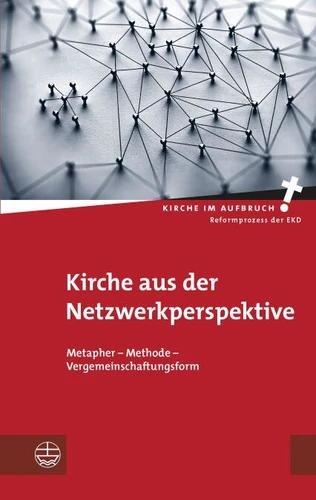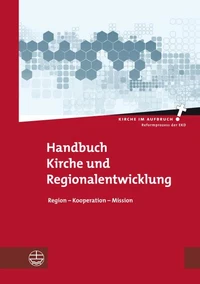Kirche aus der Netzwerkperspektive. Metapher – Methode – Vergemeinschaftungsform
Par : ,Formats :
Disponible dans votre compte client Decitre ou Furet du Nord dès validation de votre commande. Le format ePub est :
- Compatible avec une lecture sur My Vivlio (smartphone, tablette, ordinateur)
- Compatible avec une lecture sur liseuses Vivlio
- Pour les liseuses autres que Vivlio, vous devez utiliser le logiciel Adobe Digital Edition. Non compatible avec la lecture sur les liseuses Kindle, Remarkable et Sony
 , qui est-ce ?
, qui est-ce ?Notre partenaire de plateforme de lecture numérique où vous retrouverez l'ensemble de vos ebooks gratuitement
Pour en savoir plus sur nos ebooks, consultez notre aide en ligne ici
- Nombre de pages144
- FormatePub
- ISBN978-3-374-05846-4
- EAN9783374058464
- Date de parution01/01/2019
- Protection num.Digital Watermarking
- Taille2 Mo
- Infos supplémentairesepub
- ÉditeurEvangelische Verlagsanstalt
Résumé
Das Thema Netzwerk und Kirche hat Konjunktur. Sicher ist dies auch durch die Veröffentlichung der fünften Kirchenmitgliedschaftsuntersuchung der EKD (V. KMU) bedingt. Das weite Feld der Netzwerkforschung erweist sich als sehr disparat, kann aber für Theologie und Kirche wie ein Katalysator wirken. Der Auftrag der Kirche, die Kommunikation des Evangeliums, findet vor allem im Nahbereich statt, ohne auf diesen begrenzt zu sein, baut auf Beziehungen, Nähe, Austausch und Zugänglichkeit.
Viele Ergebnisse der Netzwerkforschung helfen Gemeinden, Gesamtkirche und Theologie, die enormen gesellschaftlichen Umbrüche zu verstehen und die eigene Praxis zu hinterfragen. Neue Formen der Kommunikation und beziehungsfähige Haltungen können helfen, das Evangelium mit Neugierigen, Konfessionslosen, Distanzierten und Indifferenten zu teilen. Mit Beiträgen von Christhard Ebert, Daniel Hörsch, Rainer Mainusch, Hans-Hermann Pompe, Felix Roleder, Thomas Schlegel und Birgit Weyel. [Church from a Network Perspective.
Metaphor - Method - Form of Communitarisation] The topic of networking and church is attracting much interest. One of the reasons for this is certainly the publication of the fifth church membership survey of the EKD (V. KMU). The broad field of network research proves to be very disparate, but it can act as an catalyst for theology and church. The mission of the church, the communication of the Gospel, takes place mainly locally without being limited by it.
It is building on relationships, neighbourhoods, interchange, and accessibility. Many insights of network research can help congregations, the church, and theology to better understand social change and to challenge their own practice. New forms of communication and corresponding attitudes could help to share the Gospel with people who are curious, distant, indifferent, or non-demoninational.
Viele Ergebnisse der Netzwerkforschung helfen Gemeinden, Gesamtkirche und Theologie, die enormen gesellschaftlichen Umbrüche zu verstehen und die eigene Praxis zu hinterfragen. Neue Formen der Kommunikation und beziehungsfähige Haltungen können helfen, das Evangelium mit Neugierigen, Konfessionslosen, Distanzierten und Indifferenten zu teilen. Mit Beiträgen von Christhard Ebert, Daniel Hörsch, Rainer Mainusch, Hans-Hermann Pompe, Felix Roleder, Thomas Schlegel und Birgit Weyel. [Church from a Network Perspective.
Metaphor - Method - Form of Communitarisation] The topic of networking and church is attracting much interest. One of the reasons for this is certainly the publication of the fifth church membership survey of the EKD (V. KMU). The broad field of network research proves to be very disparate, but it can act as an catalyst for theology and church. The mission of the church, the communication of the Gospel, takes place mainly locally without being limited by it.
It is building on relationships, neighbourhoods, interchange, and accessibility. Many insights of network research can help congregations, the church, and theology to better understand social change and to challenge their own practice. New forms of communication and corresponding attitudes could help to share the Gospel with people who are curious, distant, indifferent, or non-demoninational.
Das Thema Netzwerk und Kirche hat Konjunktur. Sicher ist dies auch durch die Veröffentlichung der fünften Kirchenmitgliedschaftsuntersuchung der EKD (V. KMU) bedingt. Das weite Feld der Netzwerkforschung erweist sich als sehr disparat, kann aber für Theologie und Kirche wie ein Katalysator wirken. Der Auftrag der Kirche, die Kommunikation des Evangeliums, findet vor allem im Nahbereich statt, ohne auf diesen begrenzt zu sein, baut auf Beziehungen, Nähe, Austausch und Zugänglichkeit.
Viele Ergebnisse der Netzwerkforschung helfen Gemeinden, Gesamtkirche und Theologie, die enormen gesellschaftlichen Umbrüche zu verstehen und die eigene Praxis zu hinterfragen. Neue Formen der Kommunikation und beziehungsfähige Haltungen können helfen, das Evangelium mit Neugierigen, Konfessionslosen, Distanzierten und Indifferenten zu teilen. Mit Beiträgen von Christhard Ebert, Daniel Hörsch, Rainer Mainusch, Hans-Hermann Pompe, Felix Roleder, Thomas Schlegel und Birgit Weyel. [Church from a Network Perspective.
Metaphor - Method - Form of Communitarisation] The topic of networking and church is attracting much interest. One of the reasons for this is certainly the publication of the fifth church membership survey of the EKD (V. KMU). The broad field of network research proves to be very disparate, but it can act as an catalyst for theology and church. The mission of the church, the communication of the Gospel, takes place mainly locally without being limited by it.
It is building on relationships, neighbourhoods, interchange, and accessibility. Many insights of network research can help congregations, the church, and theology to better understand social change and to challenge their own practice. New forms of communication and corresponding attitudes could help to share the Gospel with people who are curious, distant, indifferent, or non-demoninational.
Viele Ergebnisse der Netzwerkforschung helfen Gemeinden, Gesamtkirche und Theologie, die enormen gesellschaftlichen Umbrüche zu verstehen und die eigene Praxis zu hinterfragen. Neue Formen der Kommunikation und beziehungsfähige Haltungen können helfen, das Evangelium mit Neugierigen, Konfessionslosen, Distanzierten und Indifferenten zu teilen. Mit Beiträgen von Christhard Ebert, Daniel Hörsch, Rainer Mainusch, Hans-Hermann Pompe, Felix Roleder, Thomas Schlegel und Birgit Weyel. [Church from a Network Perspective.
Metaphor - Method - Form of Communitarisation] The topic of networking and church is attracting much interest. One of the reasons for this is certainly the publication of the fifth church membership survey of the EKD (V. KMU). The broad field of network research proves to be very disparate, but it can act as an catalyst for theology and church. The mission of the church, the communication of the Gospel, takes place mainly locally without being limited by it.
It is building on relationships, neighbourhoods, interchange, and accessibility. Many insights of network research can help congregations, the church, and theology to better understand social change and to challenge their own practice. New forms of communication and corresponding attitudes could help to share the Gospel with people who are curious, distant, indifferent, or non-demoninational.







